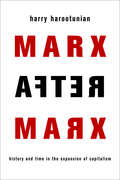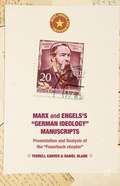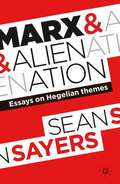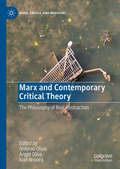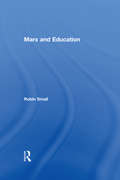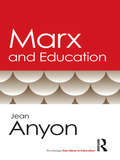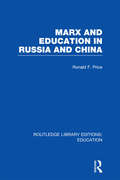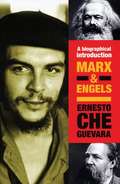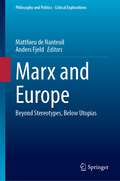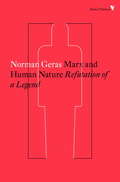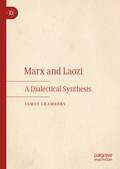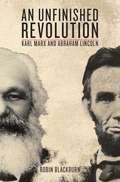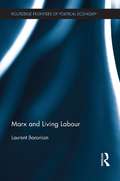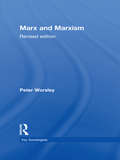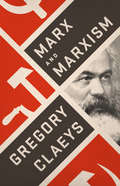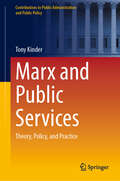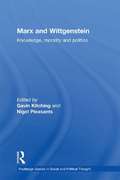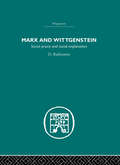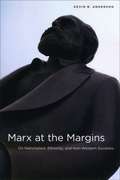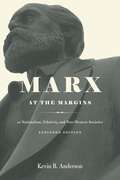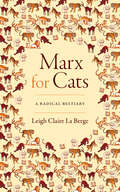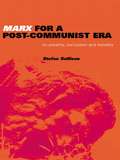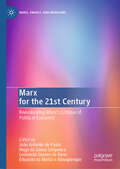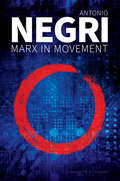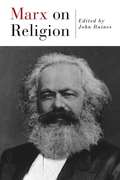- Table View
- List View
Marx After Marx: History and Time in the Expansion of Capitalism
by Harry HarootunianIn Marx After Marx, Harry Harootunian questions the claims of Western Marxism and its presumption of the final completion of capitalism. If this shift in Marxism reflected the recognition that the expected revolutions were not forthcoming in the years before World War II, its Cold War afterlife helped to both unify the West in its struggle with the Soviet Union and bolster the belief that capitalism remained dominant in the contest over progress. This book deprovincializes Marx and the West's cultural turn by returning to the theorist's earlier explanations of capital's origins and development, which followed a trajectory beyond Euro-America to Asia, Africa, and Latin America. Marx's expansive view shows how local circumstances, time, and culture intervened to reshape capital's system of production in these regions. His outline of a diversified global capitalism was much more robust than was his sketch of the English experience in Capital and helps explain the disparate routes that evolved during the twentieth century. Engaging with the texts of Lenin, Luxemburg, Gramsci, and other pivotal theorists, Harootunian strips contemporary Marxism of its cultural preoccupation by reasserting the deep relevance of history.
Marx And Engels’s "german Ideology" Manuscripts
by Terrell Carver Daniel BlankThis work presents a wholly original translation and philosophical analysis of the two authors' rough work in the so-called 'Feuerbach' chapter.
Marx and Alienation
by Sean SayersThe concepts of alienation and its overcoming are central to Marx's thought. They underpin his critique of capitalism and his vision of future society. Marx's ideas are explained in rigorous and clear terms. They are situated in the context of the Hegelian ideas that inspired them and put into dialogue with contemporary debates.
Marx and Contemporary Critical Theory: The Philosophy of Real Abstraction (Marx, Engels, and Marxisms)
by Antonio Oliva Ángel Oliva Iván NovaraThis edited volume brings together an international and interdisciplinary group of scholars to explore the traces of the idea of “Real Abstraction” in Marx’s thought from the early to late writings, as well as the theoretical and practical consequences of this notion in the capitalist social system. Divided into two main parts, Part One reconstructs Marx’s notion of “Real Abstraction” and the influences of earlier thinkers (Berkley, Petty, Franklin, Feuerbach, Hegel) on his thoughts, as well as the further elaborations of this concept in later Marxist thinkers (Sohn-Rethel, Lukács, Lefebvre, Adorno and Postone). Part Two then considers the reverberations of the notion in the field of critical theory from a more abstract critique of capitalist social relations, to a more concrete understanding of historical movements. Taken together, the chapters in this volume offer a focused look at the concept of “Real Abstraction” in Marx.
Marx and Education
by Robin SmallMarx and Education is the first assessment of the educational thought of Karl Marx (1818-1883) and its later influence, in the light of developments at the close of the twentieth century. It provides a new perspective, in which many aspects of Marx's ideas are seen clearly for the first time, freed from misleading associations and outdated prejudices. Marx's thinking on education touches on many still current issues: about personal development, the nature of learning, and the ultimate aims of education, as well as the relations between the school and society. Robin Small explores Marx's approach to each of these issues and in relating them to later developments brings the story up to the present day.
Marx and Education (Routledge Key Ideas in Education)
by Jean AnyonThere was only one Karl Marx, but there have been a multitude of Marxisms. This concise, introductory book by internationally renowned scholar Jean Anyon centers on the ideas of Marx that have been used in education studies as a guide to theory, analysis, research, and practice. Marx and Education begins with a brief overview of basic Marxist ideas and terms and then traces some of the main points scholars in education have been articulating since the late 1970s. Following this trajectory, Anyon details how social class analysis has developed in research and theory, how understanding the roles of education in society is influenced by a Marxian lens, how the failures of urban school reform can be understood through the lens of political economy, and how cultural analysis has laid the foundation for critical pedagogy in US classrooms. She assesses ways neo-Marxist thought can contribute to our understanding of issues that have arisen more recently and how a Marxist analysis can be important to an adequate understanding and transformation of the future of education and the economy. By exemplifying what is relevant in Marx, and replacing that which has been outdone by historical events, Marx and Education aims to restore the utility of Marxism as a theoretical and practical tool for educators.
Marx and Education in Russia and China (Routledge Library Editions: Education)
by R F PriceTo many education students, Russian and/or Chinese education is at the same time their introduction to Marxism, and many students go no further. This book sets the record straight by giving a thorough introduction to the writings of Marx himself as they relate to education. It shows what Marxism implies for education, as aim, method and content. It then proceeds to compare educational developments in the former USSR and China in the light of this analysis, attempting to answer the question as to how Marxist this has been, in the schools and outside them.
Marx and Engels: A Biographical Introduction
by Ernesto Che GuevaraThis Che Guevara book makes an insightful contribution to the revival of interest in Marxism. Commenting on Marx's humanism, Che writes: "Such a humane man, whose capacity for affection extended to all those suffering throughout the world."
Marx and Europe: Beyond Stereotypes, Below Utopias (Philosophy and Politics - Critical Explorations #30)
by Matthieu De Nanteuil Anders FjeldThis book provides a unique scientific contribution to the debate on Marx's legacy in proposing to critically articulate two “lines of discussion” which are most often kept apart. On the one hand, it reassesses the place of Marxian thought in the construction of Europe, seeking to revitalize the European political debate. On the other, it situates Marx' thought in the perspective of postcolonial and decolonial studies, with particular attention to their effort to overcome the indisputable limits of the Marxian legacy. In asking whether Marx’ thought was too European or not European enough, the book examines internationalist emancipatory politics and eurocentrism, class struggle and finance in the shaping of the European institutions, migration, identity and violence, as well as Marxian critiques of colonialism both within and beyond Europe. At a time of extreme tension, also within leftist politics, this book provides a precise and rigorous argument on what continues to make Marx'sthought relevant, in grappling with social domination in the era of global capitalism, while also exploring the limits of Marxism today, both at the European level and worldwide.
Marx and Human Nature
by Norman Geras"Marx did not reject the idea of a human nature. He was right not to do so."That is the conclusion of this passionate and polemical new work by Norman Geras. In it, he places the sixth of Marx's Theses on Feuerbach under rigorous scrutiny. He argues that this ambiguous statement--widely cited as evidence that Marx broke with all conceptions of human nature in 1845--must be read in the context of Marx's work as a whole. His later writings are informed by an idea of a specifically human nature that fulfills both explanatory and normative functions.The belief that Marx's historical materialism entailed a denial of the conception of human nature is, Geras writes, "an old fixation, which the Althusserian influence in this matter has fed upon ... Because this fixation still exists and is misguided, it is still necessary to challenge it." One hundred years after Marx's death, this timely essay--combining the strengths of analytical philosophy and classical Marxism--rediscovers a central part of his heritage.
Marx and Laozi: A Dialectical Synthesis
by James ChambersIn this work the theories of Marx and Laozi are dialectically combined. The resulting synthesis is a positive materialist negation of Hegel’s idealist dialectics. Syntheses are presented for Marx and Laozi in ontology, metaphysics, epistemology, scientific method, ethics and politics: the full spectrum of their foundational principles. The book is an attempt to reconstruct a materialist interpretation of Laozi, which can be put to work for Marxist theory.
Marx and Lincoln: An Unfinished Revolution
by Abraham Lincoln Karl Marx Robin BlackburnKarl Marx and Abraham Lincoln exchanged letters at the end of the Civil War. Although they were divided by far more than the Atlantic Ocean, they agreed on the cause of free labor and the urgent need to end slavery. In his introduction, Robin Blackburn argues that Lincoln's response signaled the importance of the German American community and the role of the international communists in opposing European recognition of the Confederacy. The ideals of communism, voiced through the International Working Men's Association, attracted many thousands of supporters throughout the US, and helped spread the demand for an eight-hour day. Blackburn shows how the IWA in America--born out of the Civil War--sought to radicalize Lincoln's unfinished revolution and to advance the rights of labor, uniting black and white, men and women, native and foreign-born. The International contributed to a profound critique of the capitalist robber barons who enriched themselves during and after the war, and it inspired an extraordinary series of strikes and class struggles in the postwar decades. In addition to a range of key texts and letters by both Lincoln and Marx, this book includes articles from the radical New York-based journal Woodhull and Claflin's Weekly, an extract from Thomas Fortune's classic work on racism Black and White, Frederick Engels on the progress of US labor in the 1880s, and Lucy Parson's speech at the founding of the Industrial Workers of the World.
Marx and Living Labour: Marx And Living Labour (Routledge Frontiers of Political Economy)
by Laurent BaronianFrom his early economic works on, Marx conceived the labour of any kind of society as a set of production activities and analysed the historical modes of production as specific ways of distributing and exchanging these activities. Political economy on the contrary considers the labour only under the form of its product, and the exchange of products as commodities as the unique form of social labour exchange. For Marx, insofar as the labour creating value represents a specific mode of exchanging the society's living labour, general and abstract labour cannot not only be defined as the substance or measure unit of the commodity, as in Smith or Ricardo, but foremost as an expense of living labour, i.e. of nerves, muscles, brain, etc. Hence the twofold nature of living labour, as a concrete activity producing a use value and an expense of human labour in general producing exchange value. Marx himself claimed that this twofold nature of labour creating value was its main and most important contribution to economic science. This book aims at showing how both determines the original categories and economic laws in Capital and constitutes the profound innerspring of Marx's critique of political economy. The role and function of living labour is highlighted by dealing with the difference between Marx and Classics' theories of labour value; money and the problems of its integration in economic analysis, especially in Keynes; the transition from feudalism to capitalism; the theory of capital through a discussion on the Cambridge controversy and the transformation problem; the labour process and the principles of labour management; unemployment and overpopulation; the formulas of capital in the history of economic thought; finally, an interpretation of the current crisis based on Marx's conception of overaccumulation and speculation after having distinguished it from underconsumption and stagnation theories of crises.
Marx and Marxism (Key Sociologists)
by Peter WorsleyKarl Marx probably had more influence on the political course of the last century than any other social thinker. There are many different kinds of Marxism, and the Twentieth Century saw two huge Marxist states in total opposition to one another. In the West, Marxism has never presented a revolutionary threat to the established order, though it has taken root as the major theoretical critique of capitalist society in intellectual circles, and new interpretations of Marx's thought appear each year.Peter Worsley discusses all these major varieties of Marxism, distinguishing between those ideas which remain valid, those which are contestable, and those which should now be discarded. Rather than treating Marxism purely as a philosophy in the abstract, he concentrates upon the uses to which Marxism has been put and emphasises the connections between the theoretical debates and political struggles in the real world.
Marx and Marxism (Pelican Bks.)
by Gregory ClaeysA new biography of Karl Marx, tracing the life of this titanic figure and the legacy of his workKarl Marx remains the most influential and controversial political thinker in history. He died quietly in 1883 and a mere eleven mourners attended his funeral, but a year later he was being hailed as "the Prophet himself" whose name and writings would "endure through the ages." He has been viewed as a philosopher, economist, historian, sociologist, political theorist, even a literary craftsman. But who was Marx? What informed his critiques of modern society? And how are we to understand his legacy?In Marx and Marxism, Gregory Claeys, a leading historian of socialism, offers a wide-ranging, accessible account of Marx's ideas and their development, from the nineteenth century through the Russian Revolution to the present. After the collapse of the Soviet Union his reputation seemed utterly eclipsed, but now a new generation is reading and discovering Marx in the wake of the recurrent financial crises, growing social inequality, and an increasing sense of the injustice and destructiveness of capitalism. Both his critique of capitalism and his vision of the future speak across the centuries to our times, even if the questions he poses are more difficult to answer than ever.
Marx and Public Services: Theory, Policy, and Practice (Contributions to Public Administration and Public Policy)
by Tony KinderBy evaluating previous public management research through Marxist concepts, this textbook offers innovative solutions to public service problems. It updates Marx’s framework to reflect the growth of public services, transitioning from abstract state notions to concrete service analysis. Addressing two critical gaps, the book highlights the benefits of a Marxist approach to public services and presents Marxist ideas to examine these services at a micro level. It demonstrates the relevance of Marxist frameworks for public service professionals, critically reviews current public management knowledge, and sheds light on the dynamic nature of public services against the background of neoliberalism. While doing so, the book goes beyond a Eurocentric perspective, providing cases and practical examples from developed and developing countries, with an additional focus on Asian practices. Written by an award-winning author with years of practical experience and designed for graduate and advanced undergraduate students, each chapter sets clear learning objectives and reviews existing tools and frameworks. The chapters also present new ways of improving public services, encouraging readers to apply Marxist concepts to their contexts and cultures. This will also make this book a practical resource for practitioners and professionals, seeking to resolve their grounded public services issues.
Marx and Wittgenstein: Knowledge, Morality and Politics (Routledge Studies in Social and Political Thought)
by Gavin Kitching Nigel PleasantsAt first sight, Karl Marx and Ludwig Wittgenstein may well seem to be as different from each other as it is possible for the ideas of two major intellectuals to be. Despite this standard conception, however, a small number of scholars have long suggested that there are deeper philosophical commonalities between Marx and Wittgenstein. They have argued that, once grasped, these commonalities can radically change and enrich understanding both of Marxism and of Wittgensteinian philosophy. This book develops and extends this unorthodox view, emphasising the mutual enrichment that comes from bringing Marx's and Wittgenstein's ideas into dialogue with one another.Essential reading for all scholars and philosophers interested in the Marxist philosophy and the philosophy of Wittgenstein, this book will also be of vital interest to those studying and researching in the fields of social philosophy, political philosophy, philosophy of social science and political economy.
Marx and Wittgenstein: Social Praxis and Social Explanation
by D. RubinsteinFirst published in 2005. Routledge is an imprint of Taylor & Francis, an informa company.
Marx at the Margins: On Nationalism, Ethnicity, and Non-Western Societies
by Kevin B. AndersonAnalyzing a variety of Marx's writings, including journalistic work written for the New York Tribune, Anderson presents us with a Marx quite at odds with our conventional interpretations.
Marx at the Margins: On Nationalism, Ethnicity, and Non-Western Societies
by Kevin B. AndersonIn Marx at the Margins, Kevin Anderson uncovers a variety of extensive but neglected texts by Marx that cast what we thought we knew about his work in a startlingly different light. Analyzing a variety of Marx’s writings, including journalistic work written for the New York Tribune, Anderson presents us with a Marx quite at odds with conventional interpretations. Rather than providing us with an account of Marx as an exclusively class-based thinker, Anderson here offers a portrait of Marx for the twenty-first century: a global theorist whose social critique was sensitive to the varieties of human social and historical development, including not just class, but nationalism, race, and ethnicity, as well. Through highly informed readings of work ranging from Marx’s unpublished 1879–82 notebooks to his passionate writings about the antislavery cause in the United States, this volume delivers a groundbreaking and canon-changing vision of Karl Marx that is sure to provoke lively debate in Marxist scholarship and beyond. For this expanded edition, Anderson has written a new preface that discusses the additional 1879–82 notebook material, as well as the influence of the Russian-American philosopher Raya Dunayevskaya on his thinking.
Marx for Cats: A Radical Bestiary
by Leigh Claire La BergeAt the outset of Marx for Cats, Leigh Claire La Berge declares that “all history is the history of cat struggle.” Revising the medieval bestiary form to meet Marxist critique, La Berge follows feline footprints through Western economic history to reveal an animality at the heart of Marxism. She draws on a twelve-hundred-year arc spanning capitalism’s feudal prehistory, its colonialist and imperialist ages, the bourgeois revolutions that supported capitalism, and the communist revolutions that opposed it to outline how cats have long been understood as creatures of economic critique and liberatory possibility. By attending to the repeated archival appearance of lions, tigers, wildcats, and “sabo-tabbies,” La Berge argues that felines are central to how Marxists have imagined the economy, and by asking what humans and animals owe each other in a moment of ecological crisis, La Berge joins current debates about the need for and possibility of eco-socialism. In this playful and generously illustrated radical bestiary, La Berge demonstrates that class struggle is ultimately an interspecies collaboration.
Marx for a Post-Communist Era: On Poverty, Corruption and Banality (Ideas Ser.)
by Stefan SullivanWas Marxism a variety of German Idealist self-actualization in economic form? A deeply flawed blueprint for social engineering? A catechism for post-colonial insurgencies? the intellectual foundations of modern social democracy? In this wide ranging summation, Sullivan tackles the multi-tentacled reach of Marx's legacy, and explores both the limits and the lasting significance of his ideas. Structured around three obstacles to freedom - poverty, corruption and banality - the work engages both Marx and his critics in addressing unresolved issues of the current social and political order. As such, the work, after two introductory chapters, leaves behind Marxology and its familiar cast of characters (Bernstein, Kautsky, Adorno, Lukacs, Fanon, Horkheimer, Marcuse, etc.) to address both neo-Marxist and non-Marxist interpretations of these obstacles. These include growth-led poverty alleviation, human capital theory, current debates on rent-seeking and public choice theory, weaknesses in Frankfurt School approaches to mass culture, and emerging trends in cyberspace and leisure consumption. Marx for a Post-Communist Era is credited as a foundational theoretical source in a wide range of contemporary studies. Some examples include a government-sponsored anti-corruption report in Peru, a study of neoliberalism and education reform in the UK, and an urban planning essay on museum spaces and the public good.
Marx for the 21st Century: Reevaluating Marx's Critique of Political Economy (Marx, Engels, and Marxisms)
by João Antonio de Paula Hugo da Gama Cerqueira Leonardo Gomes de Deus Eduardo da Motta e AlbuquerqueThis book offers a critical assessment of some of the most contentious topics in the Marxian critique of political economy in the light of the recent publications of the complete manuscripts and editions of Capital in MEGA. Covering issues like the incompleteness of Marx&’s critique of political economy, the long-term trajectories of capitalism, the problem of economic crisis, and the center-periphery dynamics within global capitalism, this book offers an original intervention into the current debates of the Marxist tradition precisely at a crucial moment for the research of Marx&’s critique of the capitalist economy, and recovers the true critical, dialectical and open character of Marx&’s social theory.
Marx in Movement: Operaismo in Context
by Antonio NegriThis first volume in a new trilogy of books by Antonio Negri examines and develops the Italian tradition of radical Marxist thought known as operaismo or ‘autonomist Marxism’ – the tradition to which Negri himself adheres and in which he is a leading figure. The tradition of operaismo emphasizes the role of the worker in capitalism and the primacy of class struggle. Within this framework, Negri’s key contribution has been to theorize the transition from the ‘mass worker’ to the ‘social worker’ – that is, to broaden the concept of living labour and liberate it from the theoretical cages that locked it into the factory. It was only by moving beyond the ideology and political practice of the mass worker that the revolutionary character of the Marxist concept of class could be updated for our times and developed in relation to the exploitation and socialization of living labour, including networks of cognitive work, reproductive work and care work, networks which also have the potential to become the bases for new forms of resistance to capitalist exploitation. By bringing together Negri’s key contributions to the reconceptualization of the worker and class struggle, this volume demonstrates the vitality of the Marxist tradition of operaismo and its continued relevance for understanding the key social and political struggles of our time.
Marx on Religion
by John RainesReligious suffering is at one and the same time the expression of real suffering and a protest against real suffering. Religion is the sigh of the oppressed creature, the heart of a heartless world and the soul of soulless conditions. Few people would ever expect that Karl Marx is the writer of the above statement. He not only wrote it, but he did so in the same breath of his more famous dictum that "religion is the opiate of the masses. " How can one reconcile such different perspectives on the power and ubiquity of religion?In this compact reader of Marx's essential thought on religion, John Raines offers the full range of Marx's thoughts on religion and its relationship to the world of social relations. Through a careful selection of essays, articles, pamphlets, and letters, Raines shows that Marx had a far more complex understanding of religious belief. Equally important is how Marx's ideas on religion were intimately tied to his inquiries into political economy, revolution, social change, and the philosophical questions of the self. Raines offers an introduction that shows the continuing importance of the Marxist perspective on religion and its implications for the way religion continues to act in and respond to the momentous changes going on in our social and environmental worlds. Marx on Religion also includes a study guide to help professors and students-as well as the general reader-continue to understand the significance of this often under-examined component of Marx.
